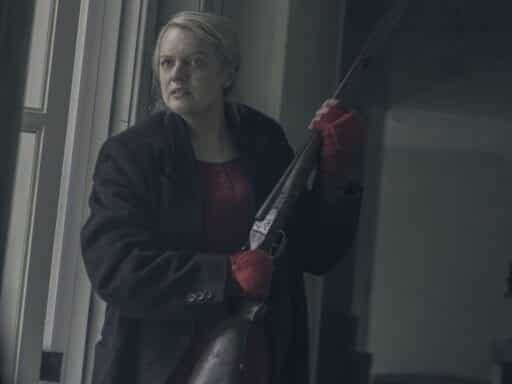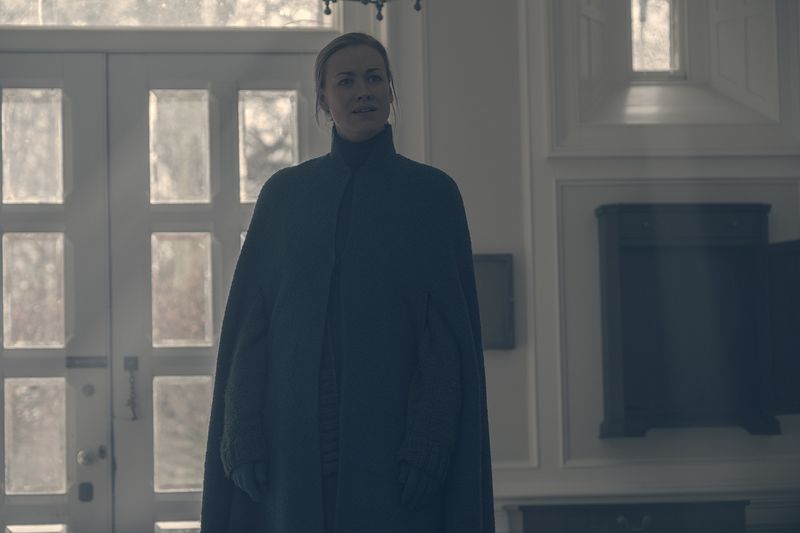
But is the show running out of story for its main character? Also: Was that [spoiler] on the radio?!
Every week, a few members of the Vox Culture team gather to talk out the latest episode of The Handmaid’s Tale, Hulu’s adaptation of Margaret Atwood’s 1985 novel. This week, critic at large Todd VanDerWerff and staff writer Constance Grady discuss “Holly,” the 11th episode of the second season.
Todd VanDerWerff: If the second season of The Handmaid’s Tale has a major flaw, it’s that the show has, in many ways, grown past its protagonist. June’s story, which drove the first season forward in myriad fascinating ways, has reached a bit of a narrative cul de sac, just as everybody else on the series has found new interesting dimensions. (Even the Commander gets some bitterly human moments in “Holly.” Ol’ Patriarchal Fred!)
I hope that the series has a fix for this in season three, because it can’t tell a long-term story where June almost escapes multiple times, only to end up back in the twisted soap operatics of the Waterford household, without feeling deathly repetitive, especially after seemingly everybody in that house is ready to murder each other.
Maybe June joins the resistance while keeping her Handmaid cover. Maybe she escapes to Canada. Maybe she goes on the run in search of Hannah. But the show needs to find something else for her to do. It needs to give her agency again, as unlikely as agency is for a Handmaid in Gilead.
That’s the central paradox of turning The Handmaid’s Tale into an ongoing TV series. You can tell a story about a character who can’t materially affect her circumstances in any way for a season or two, because you can examine the contradictions in the idea of giving someone powerless the reins of a story for long enough. But you can’t do so forever, because stories, on some level, require the protagonist to gain some measure of power if they run long enough.
All of this, I’m aware, sounds like I’m lining up to give “Holly” a poor review, but instead, it crystallized for me why the series has backburnered June so much this season. It’s a terrific, gutting episode, one that will surely win the terrific Elisabeth Moss (who gives a gutting, almost wordless performance) another Emmy Award. (Justice for Keri Russell!) It also gives June the most agency she’s had in the series so far, while also constantly reminding us that the prison she’s held in is bigger than one house. It has a wolf. And (someone I’m 99.9999 percent sure is) Oprah!
But even if June ultimately decides to be recaptured, after realizing she will probably need medical attention after delivering her baby (named Holly, after her mother) by herself, we’re still sending her right back to the Waterford house. I get that this is part of the nightmare of the show, part of the way it uses the status quo mechanisms of television against an audience that wants desperately to escape the house of horrors. But after “Holly,” I find myself hoping, even more, that the series knows what it’s doing with its main character.
Constance, is Oprah as the voice of the American resistance on the nose or just right or, somehow, both? (I vote both.)
June might be running out of story to tell, but Serena isn’t
 Hulu
HuluConstance Grady: I shamefully did not realize that the voice on the radio was Oprah until you told me so, Todd, which I realize means that I am no true American. Now that I know … I kind of love it? It’s hokey, sure, but it also seems so inexpressibly comforting that even in the horrors of Gilead, you can turn on the radio and hear Oprah! She’s still out there! It makes escape to Canada or Hawaii — to a world with Oprah in it! — seem even more idyllic, which makes June’s decision to stay in Gilead to save the baby that much more of a sacrifice.
But I agree with you, Todd, that the show desperately needs to find something new for June to do besides try to escape and then narrowly get recaptured, over and over and over again. The endless sequence in which June prepares to drive off to Canada, only to realize that, oh no, she has to find a key to the garage first, and then oh no, she has to cover her red Handmaid’s gown before she drives away and then oh no, the garage door is iced shut — it’s all tense, sure, but it’s also starting to feel dull. And not dull in a productive “I’m learning something about totalitarianism” way. Dull in a boring way. You know that it’s not going to go anywhere.
Serena Joy’s plotline is repeating itself this season, too — in more or less every episode she’s forced to reckon with the fact that she does not enjoy living in the world that she helped create — but there’s enough slow unraveling happening there to keep it compelling. This week, she finally breaks down enough to confront her husband with how unhappy she is. “I gave up everything for you, for the cause,” she tells him through tears, “and all I wanted was a baby.”
Serena has always been an avatar for the “fuck you, I got mine” ethos of commodified white feminism: Her whole thing is very Ivanka Trump posting a picture of herself hugging her son on Instagram while families are ripped apart at the border. But the complication with Serena is that she has not yet quite gotten hers yet. She doesn’t have her hands on the thing that she believes she is owed, which is a baby. Which means that she’s been operating under a “fuck you, I’ll get mine” mindset for the entire run of the show, and the more that she doubts that she will actually get “hers,” the less willing she is to embrace the status quo.
But the episode ends with June getting picked up in a van, presumably to be escorted back to the Waterford house and deliver baby Holly to Serena. If Serena at last gets what she believes that she is owed, do you think she’ll fall back in line with Gilead and the Commander?
Todd: I kind of think no, but I also don’t really know what form her rebellion might take. The season has been so focused on building up Serena Joy’s character in a way to make her unhappiness seem palpable that it’s clear the writers are laying groundwork for something. And the fact that baby Holly is a girl in Gilead can only increase the pressure Serena will surely feel about whatever is to come next.
That said — how good was that fight between the Waterfords, who are finally just done with each other but forced to stick it out because they created a society where admitting it’s over could just as easily mean they hang as anything else? I loved the Commander snipping at Serena that even if they hang, he’ll be forced to be right next to her, the sort of darkly exasperated lashing out that typifies a fight between a married couple who’s just had it with trying to be nice and thoughtful.
The fact that June can’t open an iced-over garage door sort of strains credulity — not even the car will break it open? — and I say this as someone who has labored mightily to open up iced-over doors and finally given up in favor of finding another way. But both it and that fight between the Waterfords are good examples of the way season two has weaponized its very existence against the characters. They’re all trapped together, foot on the gas, trying to make a break for it. But the only thing out there for them is more horror and death. The trees are full of wolves.
This is one of the reasons I hope that season two’s expansion of the world beyond Gilead — here we find out that the United Kingdom, at least, is leveling sanctions against the country — is pointing in the direction of some sort of longer-term arc about the American resistance. (Now I’m imagining Oprah marching through the rubble, waving the flag.) The premise of the show necessitates that the audience be kept as much in the dark about what’s going on in the wider world as the characters — another weird similarity between this show and Westworld — but to give itself room to operate, the series has to keep dropping little hints. I have to believe they’re pointing somewhere, but maybe I’m ramming my car into a garage door, too.
One other little hint of “something else” sprinkled into this episode is the presence of June’s mother, whom I was pretty sure had been a one-off role. But no, here she is again, in the flashbacks, which manage to bring in much of the show’s cast in a way that reminds you they’re out there. What do you make of all of this? Is June’s mom still alive somewhere? Are we being set up for Canada to have an increased presence in season three? Or would that break the show?
“Holly” suggests new territory for the show to explore in season three
 Hulu
HuluConstance: In order: I am into it, I hope so, I hope so, I don’t think so.
I absolutely think that June’s mother is still out there, if only because she’s such an enormous presence in the book that she’s always struck me as slightly underused on the show itself. Holly the First stands for a kind of slightly old-fashioned radicalism, a second-wave feminist rage that postfeminist June believed that she would never need, and putting that relationship into Gilead to see how it changes would be too good of an opportunity to lose.
At this point, I don’t think that the show is sustainable without expanding into Canada. We’ve become so used to how horrifying Gilead is that — as episode nine proved — we need the contrast of Canada to fully feel the horror at this point, and this episode showed that we need the plot mobility Canada offers to keep June’s storyline from continuing to stagnate and repeat itself.
That doesn’t mean that June needs to escape to Canada with her two daughters and live there happily ever after for the rest of the show, but it does mean that something in her status quo has to evolve, instead of grinding on and on forever unchangingly, and thus far Canada and the resistance that lives there seems to be the best route to that change that we’ve seen.
Besides, I’d love to get to see Elisabeth Moss play a few new notes with this character. She’s been doing wonderful work all season, and her mingled rage and gritted-teeth determination in this episode was enthralling to watch — but wouldn’t it be great to see what she can do with a June who has stopped repeating herself?
Todd: Yes, but also it’s amazing to me how Moss keeps finding new notes to play in a scenario that would have exhausted most other actors. I’ve occasionally called her the most talented actor of her generation, and watching this episode reminded me why I’ve said that. Her guttural cries as she delivered a baby, by herself, in front of a fire, in a large, rambling country manse, felt like they came from some other portion of her soul than we’d gotten to see before.
I’ve said in the past that I think all great TV shows can be boiled down to one word, if you really try. This isn’t necessarily the “core theme” or anything like that, but it is a sort of touchstone, a thing to return to, again and again, so the series doesn’t lose sight of itself. For The Handmaid’s Tale, that word is, I think, “survival.” And for the gripes I’ve shared about season two here, I think it’s been a stronger season on the whole than the first, precisely because it’s colored in some shades of survival that the first season just didn’t have access to. What do you sacrifice when you must survive at all costs? And whom do you become?
So if The Handmaid’s Tale is a survival epic, then it needs a strong performer for us in the audience to be stranded with. The series can shift June to the back burner. It can even make her a supporting player on her own show. But it always needs to be, at a moment’s notice, ready to tune back in to her as she hears the familiar but haunting strains of “Hungry Heart” or runs a car into a garage door or hobbles away from a wolf. “Holly” wouldn’t work without Elisabeth Moss. But neither would The Handmaid’s Tale.
Read More
https://cdn.vox-cdn.com/community_logos/52517/voxv.png


